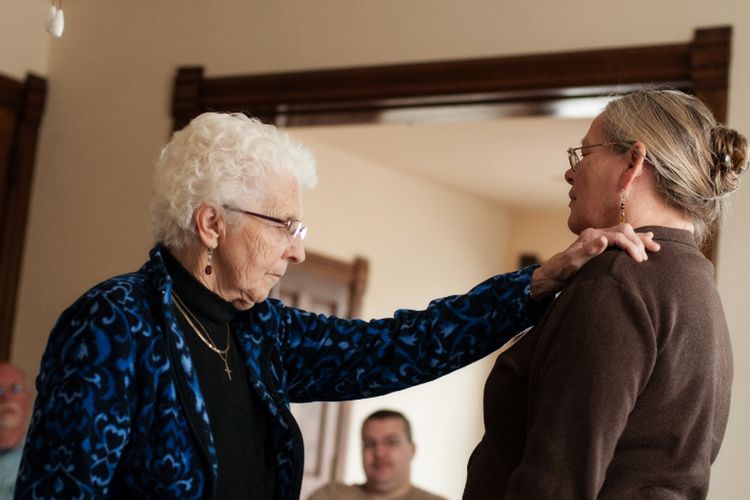With the rise of the science called epigenetics, we are now understanding that we inherit experiences from our ancestors, just as much as we inherit the color of our eyes, the shape of our nose and the length of our toes.
The positive experiences of our ancestors give us strength, skills and abilities, and the kinds of intuitive knowing that benefits our lives. But the traumatic experiences of our ancestors are another story – we seem to unconsciously relive these traumatic experiences and they contribute to emotional, financial and business problems, as well as physical illnesses and family conflicts.
One way to address and resolve inherited family trauma is through the approach of Family Constellations, a newer approach that was developed by Bert Hellinger, a German family therapist, about 30 years ago. It has been growing since that time, expanding throughout Europe, Russia and Latin America, and now becoming established in the United States and Canada.
Family Constellations touch beneath the level of our conscious inner images and the stories we tell ourselves. As such, what happened in our families is more important than what we tell ourselves about it. The events and the facts about experiences, rather than our images or interpretations, are key to resolving this intergenerational pain.
For instance, a person arrives in the psychotherapy office, speaking of her persistent and ongoing depression. Traditional talk therapy has not contributed to significant change, nor have self-help books, support groups, or several trials of medication. When the practitioner investigates into previous family trauma, however, we learn that three children of her grandmother – who would have been her great aunts and uncle – died of a scarlet fever epidemic during the same month when they were quite young.
Treatment consists of identifying the trauma and setting it up in the therapy space, either with group members standing in for family members; with small objects on a table top or sand tray; or within guided imagery. We are able to envision and embody how the family internalized the grief, how the unresolved grief has been carried down the generations and how it can be properly mourned, with the three little children holding their fate.
In a business coaching session, an aspiring business owner is struggling with a new but seemingly failing enterprise, despite the fact that he invented a needed community service and is doing all the “right” actions to market and promote his business. He speaks of self blame, negative thoughts and feelings of hopelessness.
The business coach learns that the man’s great-grandfather lost his fortune during the Depression, causing great personal distress and loss of social status to the family. This clue permits the coach to use Family Constellations to heal the unconscious wound through healing sentences and an assignment to create a home altar to reconcile the family trauma.
In another situation, a middle-aged man suffers from a mysterious and chronic pain in his right foot, a illness that has not relieved by conventional medical treatment or alternative therapies like acupuncture and massage.
On a near-whim, he decided to attend a weekend retreat which employs Family Constellations. During the retreat, he remembers that his father, who served in the U.S. Army during World War II, was badly wounded in his foot – the right foot!
With this knowledge and a ritual to honor the father’s suffering, the man finds significant relief from his foot pain. Three months later, he reports that the pain has completely disappeared.
If you are interested in Fancily Constellations as a route to addressing and healing your own inherited family trauma or building and expanding your skills as a healing practitioner to include this method, it is first important to know that there are several kinds trauma that we inherit from our ancestors.
In looking at the family tree, we include parents, siblings, uncles, aunts, grandparents and – in cases where they met a dramatic fate – great-grandparents and even earlier family members.
We also include premarital partners of parents and grandparents, since their presence and experiences may impact those in family system related by blood.
In present-day family, we include former partners, spouses and children from previous relationships.
Overall, we want to know:
- What happened in your family that was tragic, traumatic or unusual?
- Did anyone:
- Die (mother or child) during or shortly after childbirth?
- Find her life at risk during childbirth?
- Suffer illness or disability resulting from having given birth to a child? (This includes your mother, grandmother, great-grandmother, and former partners of your father and grandfather).
- Die at a young age?
- Did your partner or child die?
- Did your father, mother, or sibling die when you were young?
- Did a parent or sibling of either of your parents die when your parents were still young?
- Did anyone have a former spouse, fiancé, partner or lover?
- Did anyone have an abortion or a miscarriage?
- A still born child?
- A child born out of wedlock?
- A child who was abandoned or given up for adoption?
Did a former spouse, fiancé, partner or lover have:
- An abortion or miscarriage of your child?
- A stillborn child by you?
- An illegitimate child by you?
- A child by you who was abandoned or given up for adoption?
Did anyone:
- Attempt or commit suicide?
- Have a serious or long-lasting illness?
- Have a physical or mental disability?
- Was institutionalized for any reason?
- Commit a murder, other serious crime or a war crime?
- Survive or die in the Holocaust or another cultural trauma?
- Was enslaved?
- Die in action during military service?
- Become a missing person?
- Join the clergy or enter a monastery?
- Find themselves excluded, ignored, disowned, not respected, or otherwise not honored?
- Was anyone treated with contempt, cast out, shunned or slandered?
- Not married, or belittled or thought less of?
- Experience being taken advantage of?
- Emigrate to another country?
- Lose a fortune?
- Live an unusual or unconventional life?
- Experience a difficult birth (such as caesarean)
- Suffer traumatic or life threatening events
- Experienced separation from mother at early age (staying in hospital, given for adoption, sent to foster care, mother not available, etc.)
Through what are known as the "Orders of Love," key points about it takes for a system to operate in a healthy way, Family Constellations gives us the means to resolve these traumas and put them into the past.
The practitioner may proceed with several options, often placing representatives for the person seeking help and the problem within a space to notice the unconscious dynamics that have developed in a family system to survive the trauma.
The practitioner typically repositions people to stand at another place within the space, provides healing sentences for one or more people to say to each other or suggests other simple rituals. Representatives often verbalize how they feel after each action or alter their own position according to their energetic sense at the moment.
At best, each action contributes to a greater sense of peace within the represented family system, which is taken as a new picture for the person seeking help.
For those open this this unconventional work, people report positive shifts within their family relationships as well as improved health and the sense of being able to live life more fully.













